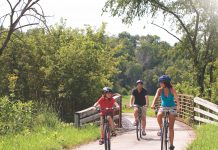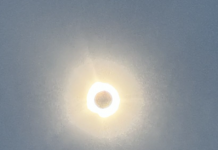
MINNESOTA GNEISS TEAMMATES EMMA BURGESON AND PAIGE NORMAN PREPARE FOR THE YUKON 1,000 CANOE AND KAYAK RACE. PHOTO COURTESY OF PAIGE NORMAN.
When Minnesota Monthly last spoke with Emma Burgeson and Paige Norman, the Minnesota Gneiss said their goal was to complete the Yukon 1000, the world’s longest canoe and kayak race. Not only did Minnesota Gneiss cross the finish line, but they placed fourth overall and third out of all canoes, becoming the first women’s team to complete the race. We caught up with Burgeson as she reflected on her paddling adventures.
MnMo: First of all, congratulations! How does it feel to have completed the race?
Burgeson: Having completed a goal I had been working toward for two years feels wonderful. It’s fun to talk about now that all of the planning is over, but now everyone asks what’s next and I have yet to figure that out.
MnMo: What was it like at the finish line?
Burgeson: The finish line was slightly underwhelming, but incredible. We got closer and closer and couldn’t see anyone on shore. I was so disappointed, but I knew that at the very least, my parents had to be there. We came around the last small point and there they were! The first three teams, my parents, the race director, they were all cheering for us and it felt like a giant weight had been lifted off my shoulders. We immediately started swapping stories with the other racers. It was fun to hear about the similarities and differences in our experiences.
MnMo: What was the significance of being the first all-women team to complete the race?
Burgeson: We wanted to show everyone that women are an important part of wilderness travel and adventure racing. Our time was faster than many teams that have competed in the past as well. There were things we had to think and worry about that the other teams didn’t, like how to go to the bathroom without stopping on shore and the thought of “what if strange people crashed our campsites at night?” We hope that we can encourage women to have more confidence in the wilderness, especially in tackling goals as big as this. Wilderness travel is for everyone.
MnMo: What were some of your biggest challenges during the race?
Burgeson: One of our biggest challenges was getting up in the morning. We would try to set our alarms for four or four and a half hours of sleep, but we almost always ended up sleeping five. After a few days we accepted that we needed to sleep more, so we decided we’d be more efficient during the day and use the extra sleep to our advantage. One of my personal challenges was the responsibility of making good backcountry decisions. Paige didn’t have back country travel experience, so it fell on me to navigate and find safe camps at night. There were some tough calls, it took a lot out of me mentally on the tough navigation days.
MnMo: What were some of the best moments during the race?
Burgeson: We came into Dawson really late on night four and had a cheering squad. My mom was driving along the race and had met some people who waited for us to get in that night. We couldn’t believe how many people believed in us, but we were so out of it we didn’t really know what to do except give a little wave.
MnMo: How did you pass the time while canoeing?
Burgeson: We talked a lot. Since we didn’t know each other super well, we had a lot to talk about. We listened to podcasts (“Invisibilia,” “This American Life,” “RadioLab”) and music. Lots of Sia! Her song “Unstoppable” got me through a lot of tough days.
MnMo: How did you grow as a canoer–and as a person–from this experience?
Burgeson: I’ve spent so much time in the wilderness, true wilderness, but this race gave me a different level of confidence. One day we ran into another team that was incredibly lost. They were middle-aged men, and I immediately lost all confidence in my navigation skills and second guessed every decision I was making. I’d never been on a co-ed backcountry trip, and even though I knew I had more experience, I felt the need to confer often. It taught me that my age and gender have absolutely nothing to do with my ability to travel and race through the wilderness. It taught me that I can trust my judgment and skills that I’ve learned and practiced for years.






